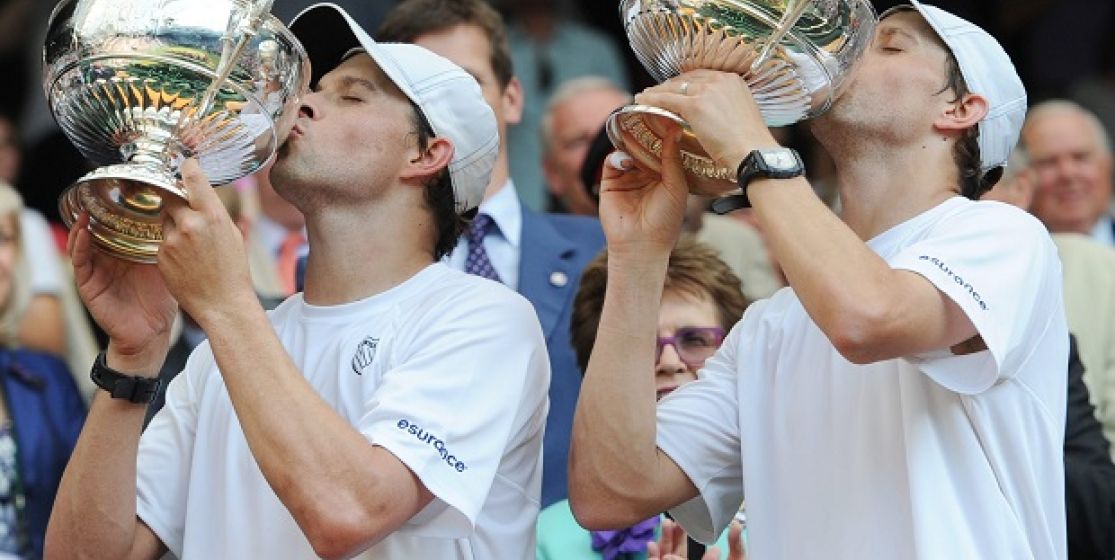One played a dozen singles matches, the other left the tour at 26. The Bryan brothers chose to live together rather than dying alone. A good idea since their duo has accumulated Grand Slam titles. Or how two average players make the best doubles team when associated.
It's the kind of success story America loves so much. Twin brothers, one left-handed, one right-handed, who makes of tennis, an individual sport by definition, a collective adventure. Mike and Bob Bryan are known as THE ultimate doubles duo and are the greatest threat of each tournament they play: together, they won a whopping record of 94 tournaments, or the record of titles obtained by the same team. Inseparable, accomplices and efficient, the Bryan brothers have managed to capitalize on their personal history to build a powerful image. "Today, it’s the only doubles team that can ask for financial guarantees before entering a tournament," says Julien Boutter. In the U.S., historic nation of tennis but lacking of stars at the moment, the duo fills stadiums. After all, in their discipline, they are huge stars, just as Federer or Nadal in singles. In 2012, Mike Bryan has reached the symbolic threshold of 300 weeks as World No. 1 in doubles in the ATP technical rankings. And yet he's the less gifted of the two...
Only 14 matches in simples
Mike Bryan is a player so average technically so that we can wonder whether he plays the same sport than the others. In fact, it is even difficult to describe this tennis player: the right-hander has so to speak played 14 professional singles matches in his career. "Yet, when on the court with his brother, he is definitely not the weak link of the team. He’s very efficient. The two complement each other perfectly and are at the same level" according to Florent Serra, who faced the siblings with Sebastien Grosjean ten years ago. Potentially more complete and once close to the top 100 (his highest ranking: 116th World), Bob, the lefty, didn't try much harder. In 2004, he decided to abandon the simples to focus on the doubles full-time. A pragmatic choice "If he was strong enough, he would have continued his career in singles. But he didn't have the level to make it to the top 30, let alone to win a Grand Slam title in singles. Instead, he won 15 with his brother," says Florent Serra. But above all, their decision proved to be good for business, as highlighted by Julien Boutter: "Even if the doubles get less media attention, there is still a lot of money at stake. Together, they made more money that they could ever have made if they had played their separate ways. From the moment you make more money in doubles than in simples, you might as well focus on it. They are not the first who did this, and their choice is even more legitimate since they are twins."
«Being in the top 30 in both singles and doubles is impossible »
Their common blood has indeed became their main weapon. "My mother has a twin sister, I know what it's like. When you're inseparable, you know each other perfectly. And there’s a practical side to work automatisms daily, for 5 hours per day, something that no one else has time to do. In addition, one of them is left-handed and the other one is right-handed, this is the perfect team," explains Julien Boutter. Their huge palmares also has cyclical origins. 25 years ago, the stars could play both tables in Grand Slam tournaments. But these days are long gone. Back then, the seeded players could benefit from relatively free tables until the quarterfinals and thus manage their efforts. "It is no longer the case, warns Boutter. The simples are too physically demanding: over time, being in the top 30 in both singles and doubles is just impossible. You have to choose. But if Federer and Wawrinka decided to start playing in doubles, they would play against specialists and would only make it to the final on the quality of their shots..." In short, the Bryan brothers can thank the homogeneity of the men's tour.






